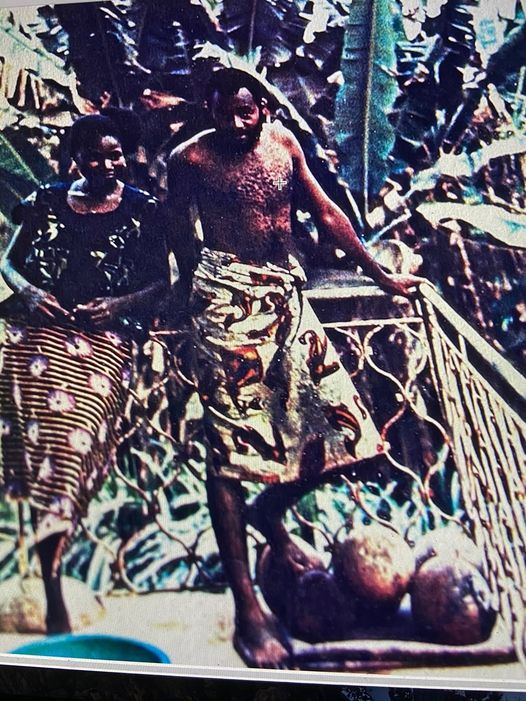ENGLISHMAN IN BENIN CITY, 1981, (Part Three)
ENGLISHMAN IN BENIN CITY, 1981, (Part Three)
They took Obaseki to a native doctor in Benin, straight from the police cell.
I ran into him about six months later when he was released.
His condition had deteriorated remarkably. He looked gaunt and shrunk. He must have lost about fifty pounds, (and he weighed not less than 175lbs and stood at 6’ tall when he assaulted Steve). His face had dark blotches and rashes all over it, and he moved with a stoop that made him look much shorter, as he gingerly carried his tray of food from the counter to a table.
I knew that he saw me as I entered the Ekewan campus cafeteria. But he quickly averted his face, pretending that he didn’t notice me. I went to the food counter to place my order. I decided I would surprise him by joining him at his table once I got my food.
He was an assistant lecturer at the University of Benin, and it was inevitable for us to meet because we were both on the Ekewan Campus. I was a graduate student in painting.
He was a scholar of drama history. Quite striking was the obvious fact that he was a perfect replica of the young Wole Soyinka—salt and pepper hair, deep scowl, the same type of goatee. He had a similar height and build as Soyinka. It was as if an old picture of Soyinka came alive. Just like Soyinka, Obaseki graduated from the University of Ibadan, Soyinka’s alma mater. And he wore the afro hairstyle of Soyinka, but without the all-gray signature of the Nobel laureate. Obaseki was more black than gray hair, yet he still bore a remarkable semblance to Kongi.
But when you look closely, you could tell he was not a Wole Soyinka. Obaseki’s face was softer, almost feminine. He fidgeted and could never keep his body still. He also tended to avoid your eyes when talking with you. Soyinka would stare at you like a lion about to pounce, (and he was not a stranger to pouncing, ask Yakubu Gowon). Obaseki was different. As a Benin native, he spoke in the pidgin English, which the young Soyinka didn’t use much.
It was Rufus who brought Obaseki home one evening and introduced him to me. Obaseki was a new hire in the drama department at Uniben, Rufus told me. Later I wondered why Rufus was interested in Obaseki, because normally Rufus did not take well to art theoreticians. If you were not a studio artist making and doing practical things, and if all you did was write, Rufus said, you were just a fake.
But Rufus told me that he was partial to Obaseki because all the other lecturers in drama disliked Obaseki and spoke derisively about him. That, alone, was enough reason for Rufus to be protective of Obaseki, and he whisked him home one evening after a meeting of the lecturers.
Obaseki visited us at home quite regularly, at least once a week. He was no longer a guest, Rufus told Obaseki, he should feel like a member of the family. Quite peculiar of Obaseki was that he always brought his beer with him when he visited. He said he got the habit from his stay in Belgium. I asked him to tell me more about Belgium, especially since he always seemed anxious when speaking of Belgium.
“I don’t like talking about Belgium,” Obaseki explained to me. “They turned me into what I am, a shadow of my former self.” I disagreed. “No,” I said, “you look perfectly excellent to me.”
“Thanks, Moyo, but you are too kind,” Obaseki said in his gentle and soft way, gracefully. “But you didn’t know me before I went to Belgium.”
His expression instantly changed into an aggressive stance. His eyes sparkled with a cold touch of craziness and despise: “Those racist communists. I hate them!”
“But it couldn’t be all of them,” I responded. “Perhaps some of the people you interacted with….”
“You don’t know what they did to me!” He snarled at me. “They are not human. They are as frozen and mechanical as their deadly winter. These are people who think nothing of reporting against members of their family to the state. They are all spies, keeping an evil eye on you. The only thing available there is whiskey—well, also lots of potatoes and beef too!”
“To be candid with you,” I admitted, “I know nothing about Belgium. You are the first person who went to Belgium that I know.”
“When I was an undergraduate, it was my lecturer in improvisation at UI, a visiting lecturer, who sold me on Belgium.” Obaseki told me. “He was a lonely white man from Belgium who always invited me to his house to drink. He had excellent whiskey from Belgium in his house all the time. And he also made wonderful barbeque. He was dating one of the undergraduate students, a thin woman who looked very boyish. Moyo, I swear, I didn’t know anything about sex at that time. I was just 18.”
TO BE CONTINUED
Interested in some of my published works?
Follow Me






